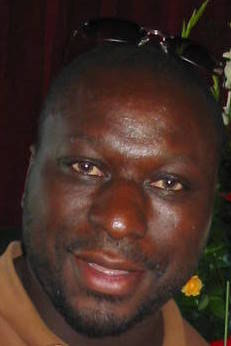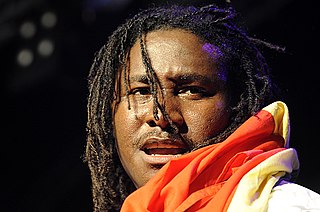
Youssou N'Dour is a Senegalese singer, songwriter, musician, composer, occasional actor, businessman, and politician. In 2004, Rolling Stone described him as, "perhaps the most famous singer alive" in Senegal and much of Africa and in 2023, the same publication ranked him at number 69 on its list of the 200 Greatest Singers of All Time. From April 2012 to September 2013, he was Senegal's Minister of Tourism.

Senegal's music is best known abroad due to the popularity of mbalax, a development of conservative music from different ethnic groups and sabar drumming popularized internationally by Youssou N'Dour.
Mor Dogo Thiam is a Senegalese musician, cultural historian, and entertainment consultant. His surname is pronounced "Chahm".

Positive Black Soul is a hip hop group based in Dakar, Senegal, one of the first such collectives in the country. Founded in 1989, the group is composed of Didier Sourou Awadi and Amadou Barry, both of whom had previously been in other hip hop groups. They perform in the English, French, and Wolof languages and use traditional Senegalese instruments as part of their songs. Political and social activism have played important roles in the group since it was founded.

Articles related to Mali include:

Iba N'Diaye was a French-Senegalese painter. Trained in Senegal and France during the colonial period, N'Diaye utilised European modernist fine arts training and medium to depict his views of African realities. He returned to Senegal upon its independence, and became the founding head of Senegal's national fine arts academy. Disenchanted with the prevailing artistic and political climate of mid-1960s Dakar, N'Diaye returned to France in 1967 and exhibited around the globe, returning to his birthplace of Saint-Louis, Senegal, to present his work in Senegal again only in 2000. N'Diaye died at his home in Paris in October, 2008 at the age of 80.

Pierre Mustapha "Mouss" Diouf was a French-Senegalese actor, comedian and humorist.

Didier Awadi is a Senegalese rapper and a significant figure in Francophone West African hip hop. As a founding member of Positive Black Soul (PBS) with Duggy Tee, Awadi toured around the world contributing to the international popularity of Hip Hop Galsen. Awadi works as a solo artist, accompanied by his crew PBS Radikal. He participates in the Senegalese music industry through his label, recording studio, and rehearsal space, Studio Sankara. Awadi offers a conscious and revolutionary style of music strengthened by articulated and rooted messages. His motivation and inspiration is grounded in the Burkinabé revolutionary Thomas Sankara's phrase: "Let's dare to invent our future!"
Lord Alajiman is a Senegalese hip hop artist and entrepreneur. He is one of the member of the now internationally known group Daara J with whom he performed and toured throughout the world until 2008 when the group split. Since then, Alajiman evolves in a solo career while contributing to the development of the music sector in Senegal. In 2009, he created Baatine Agency, a communication agency centred on Karbone 14, which repeatedly organised the shows of Morgan Heritage in Dakar. Citing Cheikh Anta Diop, Alajiman claims to understands the development – one oneself or a sector in general – as ”the acceptance of new elements”.
ALIF is the pioneer female hip hop trio of Hip Hop Galsen. Emerging in the late mid-1990s, ALIF offered a feminine and feminist flavour to Hip Hop Galsen encouraging women to play their part in the movement. The group split beginning of 2010 after thirteen years.
Baay Sooley is a hip-hop dancer from Senegal. He has toured internationally as a dancer of the Positive Black Soul (PBS) crew. He choreographed the hip hop musical comedy "The Extraordinary Stories of the Poto-Poto Children". and created the street wear brand "Bull Doff".
Gee Bayss is one of the pioneer DJs in West Africa. Member of the group, Pee Froiss, he toured throughout the world with his sure-fire turntablism which had crowds jumping whenever the group was performing. Combining solo projects with international tours of the Pee Froiss, Gee Bayss is actively engaged in transmitting his deejaying art to the younger generations.
Keyti is one of the first and most prominent hardcore hip hop artists in Senegal. With his group Rap’Adio, he offered a radical approach to Hip Hop Galsen violently recalling the initial purpose of hip hop as a means to denounce society’s flaws. Still radically critical, though less hardcore, Keyti now evolves in solo. He is part of the West African hip hop collective AURA and performs in its well-known musical comedy The Extraordinary Stories of Poto-Poto Children.
K-ID is a Senegalese artist and one of the two members of the group Chronik 2H. He stands as one of the hip hop entrepreneur actively contributing to the structuring of the music sector in Dakar. Well known for his talents as musical producer, having realised several tracks and albums for local hip hop artists, K-ID has now intensified his participation in the local music economy with the creation of his structure Oracle Vision Future, specialised in audiovisual production. Through this new initiative, K-ID expresses his desire to give a new and professional impulsion to the Hip Hop Galsen and, the African Hip Hop in general.
Matador is one of the most prominent figures of underground Hip Hop in Senegal. Founding member of the Thiaroye’s group, WA BMG 44, Matador has toured throughout the world gaining an international recognition from the underground hip hop scenes abroad. Since 2006, his struggle to represent the voiceless youth of his home country has taken a renewed turn with the creation of his structure, Africulturban in Pikine. Through this space dedicated to the youth, Matador reiterates his social and political engagement while pursuing his role of “Number One System Enemy” and “General Major Chief of the Dying People Army”.

Following an historical process of appropriation of American popular music by Senegal, hip hop emerged in the Senegalese capital city in the early mid- 1980s. Although hip hop galsen is now famous for its diverse musical productions, the movement there spread out from its dancing appeal rather than from its musical one. Indeed, Senegalese hip hop artists initially participated in this movement as smurfer, breakdancer, B-boy in general performing during organised podiums. Schools, nightclubs and other temporary public stages thus played an essential role in amplifying this movement in Dakar. Besides, and in contrast to American hip hop, which grew from the youth in the inner city ghettos, hip hop in Dakar began among a somehow middle-class youth who was able to access and/or introduce in their home place new ideas and new cultural expressions coming from abroad. Indeed, hip hop became popular in the capital city through the intensive through informal circulation of VH7 cassettes and recorded videos, which were imported from USA or France by diaspora people.

Moussa Sene Absa, Moussa Sène Absa, or Moussa Sène Absa is a Senegalese film director, editor, producer, screenwriter, painter and songwriter. He was born in 1958 in Tableau Ferraille, a suburb of Dakar, Senegal, to a Serer family.

Joof or Diouf is a surname that is typically Serer. This surname is also spelt Juuf or Juf.

Karim Ouellet was a Senegalese-born Canadian pop singer-songwriter. He released three albums between 2011 and 2016; his second album Fox won a Juno Award in 2014.

Wagëblë are a Senegalese hip hop act. Their debut album was released in 2003.












